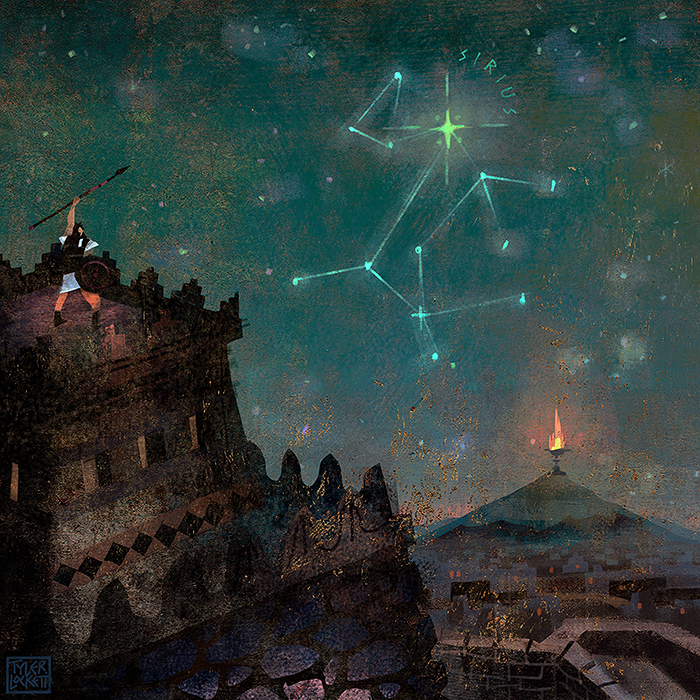This list of Greek gods includes the Titans, the 12 great gods of Olympus, and some lesser Olympians.
These gods are the oldest and, perhaps, most important in the Greek pantheon.
They first came to us by way of Homer’s Iliad, written down almost 1,000 years before Christ. And they’re still as culturally relevant today as they were then.
The enduring relevance of the Greek pantheon
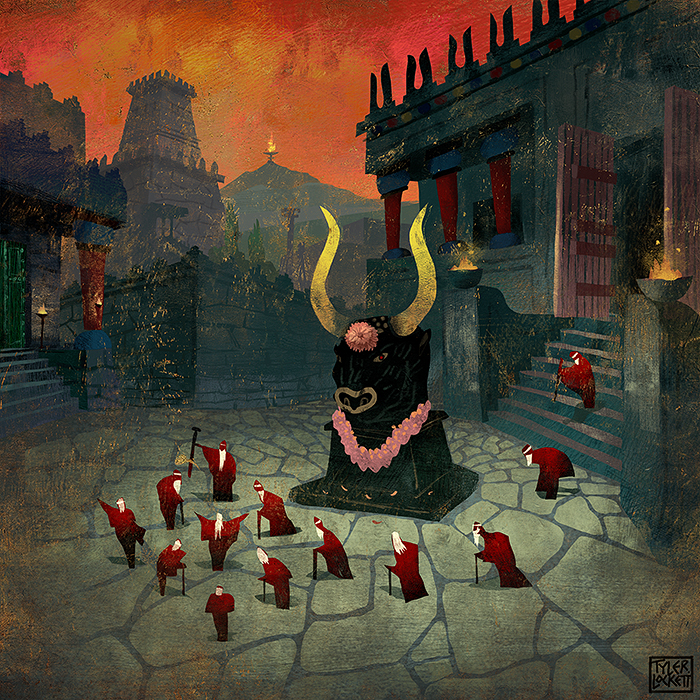
There’s one outstanding reason the Greek gods still matter after all these thousands of years since their invention: they look like us.
Yes, that’s right. The Greek gods are exceptional because their inventors envisioned them as humans, albeit beautiful, radiant ones. This fact in itself was a giant leap for humankind’s conceptualization of the divine.
The Greeks were the first civilization to imagine their gods in idealized human forms.
To illustrate this, compare the Greek gods with those of ancient Egypt. Let’s take the falcon god Horus or the stiff, winged Isis for example. These gods are certainly humanoid. But they’re not human. They lack the perfectly proportioned, unmistakably human faces and bodies of gods like Poseidon, Athena, and Ares.
In this way the Greeks were pioneers.
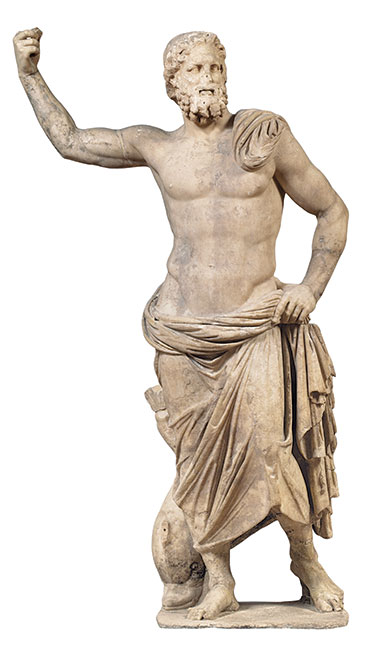
And their pioneering outlook was predicated on two principles: 1. Greeks were the first people to believe that humanity’s place was at the center of the universe, and 2. the Greek world was largely a rational one.
Accordingly, the Greeks observed themselves — that is, their human forms — and, quite reasonably, applied what they saw to their rulers in the heavens.
Then they co-opted their gods in an attempt to explain the physical universe. The Greek gods functioned as placeholders early on: They were used to explain natural phenomena and the complexities of the human psyche until later Greeks replaced them with science and philosophy. It’s safe to say that as early as the Classical Period, but certainly by the Hellenistic, most educated Greeks no longer believed in the material existence of these gods. These later Greeks eschewed superstition for philosophy, astrology for astronomy, and magic for mathematics.
But their achievements in the sciences and humanities never extinguished the Greek lust for myth and imagination. Rather they often used mythology not only in spite of their advancements but in the service of future ones, e.g. Plato using Greek myth to illustrate logic in his dialogues.
So, who were the Greek gods?
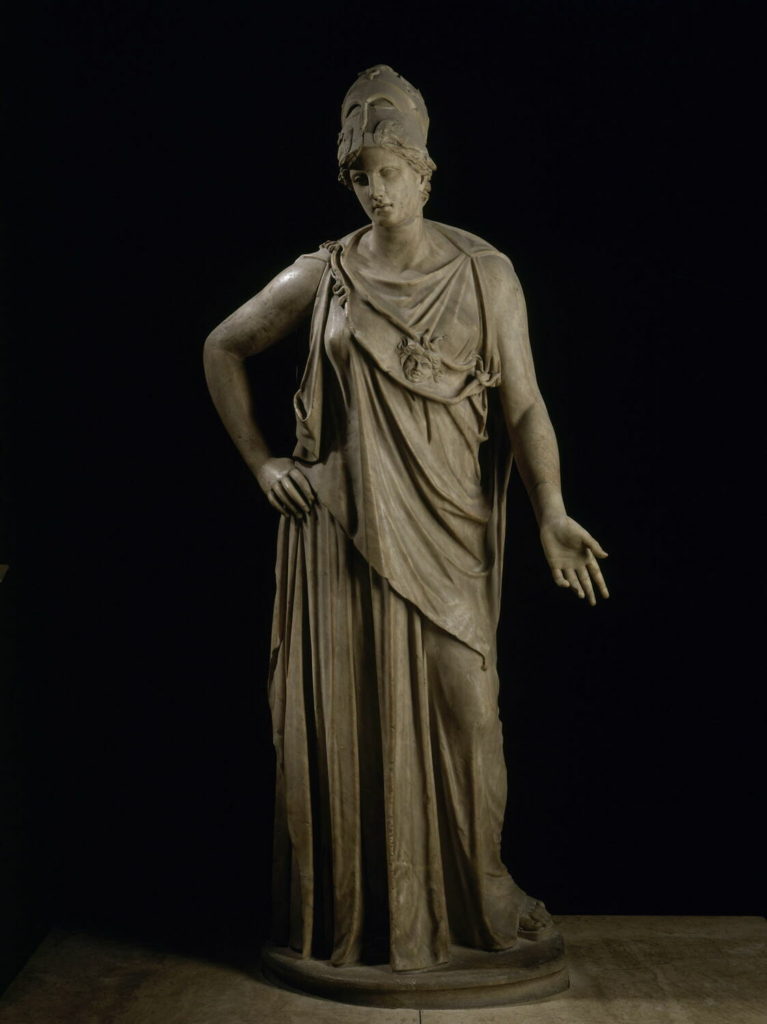
On the surface, they were a family of immortals who dwelt in the heavens above Mount Olympus, occasionally descending to Earth to meddle in human affairs. They each had a physical connection to a different location in the Greek world, e.g. Apollo and Artemis on the island of Delos and Aphrodite on Cyprus. And each god had a unique character.
They weren’t morally superior to the average mortal. In fact, they can hardly be called role models on account of their philandering, tricks, and otherwise miscreant behavior. And for this reason the Greek gods most strikingly differ from the Judeo-Christian notion of the divine as all knowing, all powerful, and wholly good.
But it’s also for this reason that they’re so fascinating.
So without further delay, let’s get into it.
Here goes a list of Greek gods, their main attributes, and their positions in the Greek pantheon:
The Titans
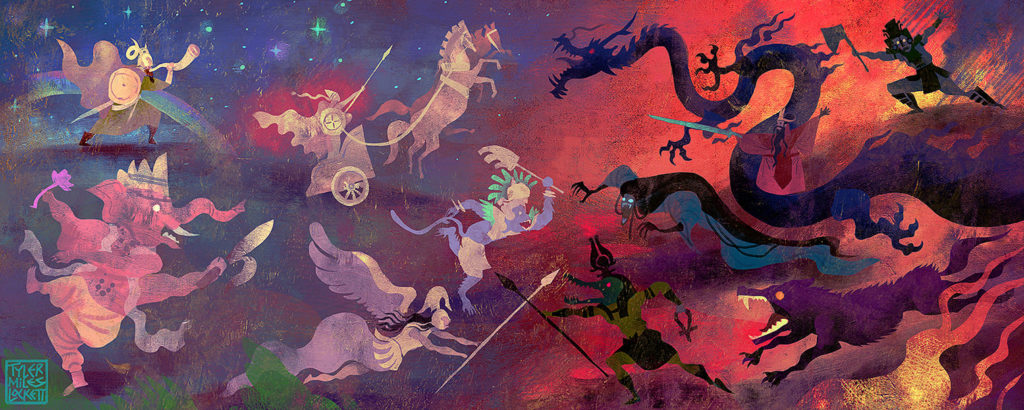
Before time began, the universe created Uranus (heaven) and Gaea (Earth). And from them sprang the first gods: The Titans.
In Theogony, Hesiod reports that there were 12 of them, of which there were six brothers and six sisters. Each was associated with a unique power, virtue, or domain of the natural world. The brothers were Crius (ruler of constellations), Cronus (ruler of the universe), Coeus (intellect), Hyperion (wisdom & light), Iapetus (mortality), and Oceanus (the sea). The sisters were Mnemosyne (memory), Phoebe (prophecy), Rhea (fertility), Tethys (fresh water), Thea (sight), and Themis (justice).
And several of these brother and sister titans married one another. Notably, Rhea, goddess of fertility, was wed to Cronus, the youngest titan who was also the group’s haphazard leader. These two gods produced six children. And for a time, all was well.
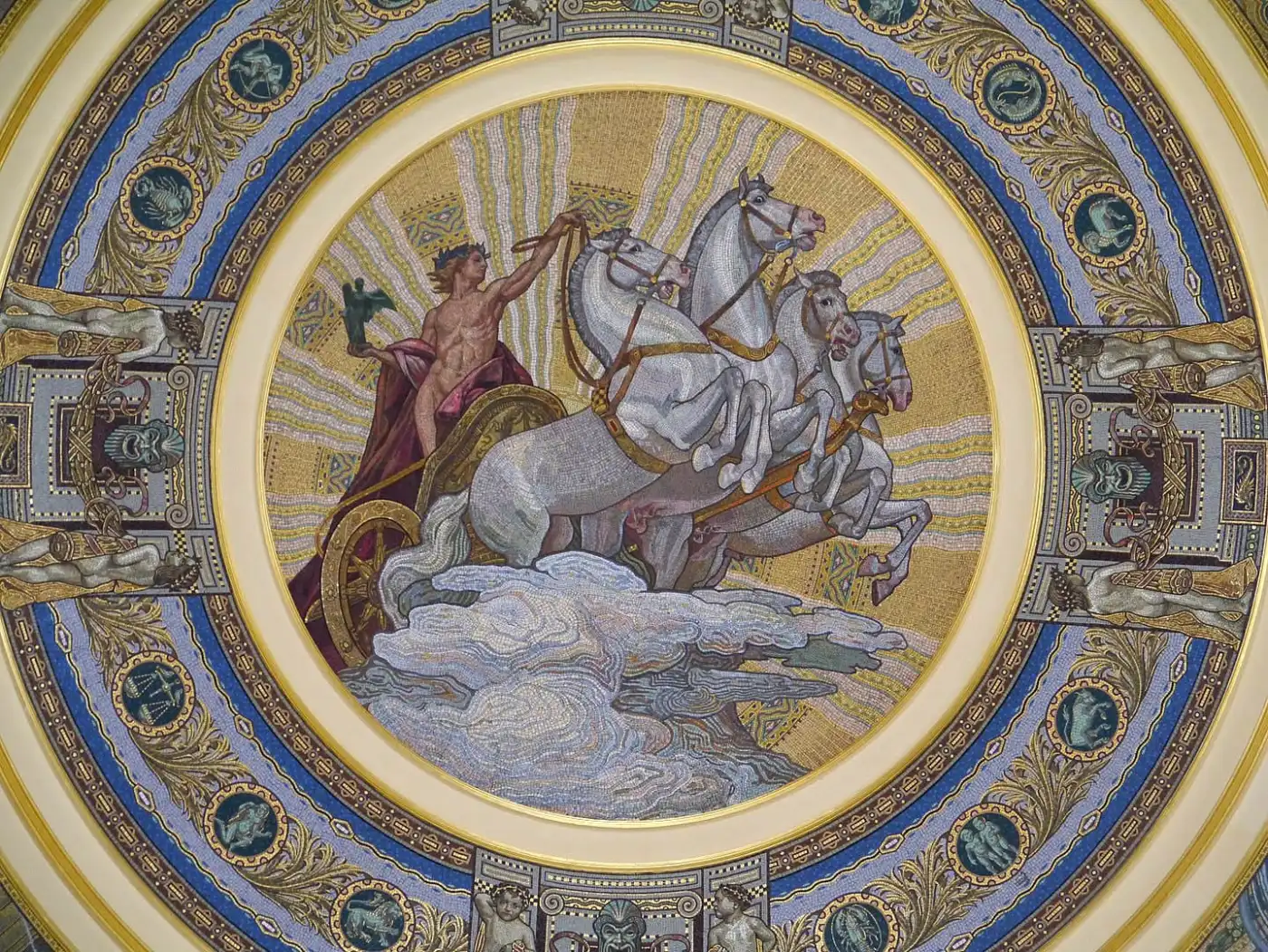
But absolute power swiftly corrupted Cronus. He became mad with paranoia after learning about a prophecy that he’d be overthrown by one of his children. So he swallowed all of them except for the infant Zeus, who had been successfully hidden from him in Crete.
Zeus went on to reach adulthood and fulfill that prophecy. He waged war against his father and the other Titans, which gave rise to a new set of gods: The Olympians.
The Olympians
Most of the Olympians were children of the Titans. They’re the second generation of gods who claimed rulership of the universe after winning the War of the Titans.
And each Olympian is associated with a unique animal, tree, or physical location in the Greek world.
Like their predecessors, there were twelve of them:
Zeus
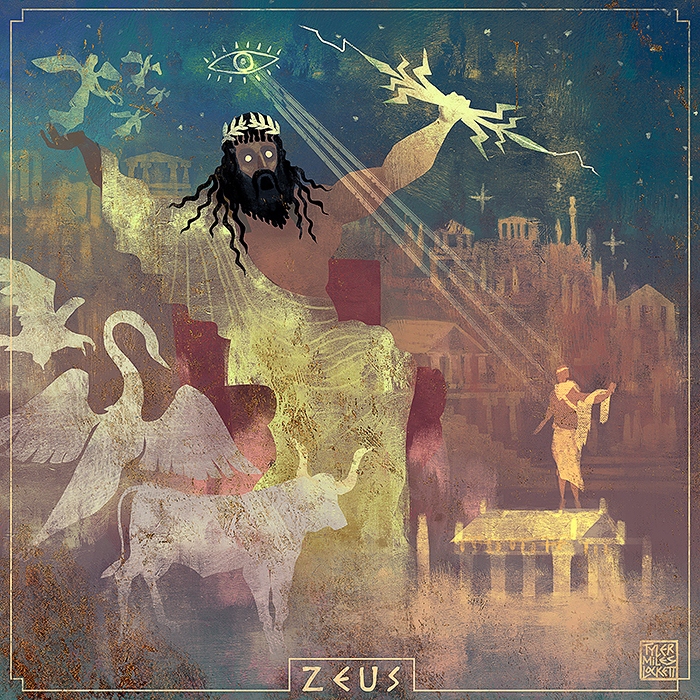
- Animal: Eagle
- Tree: Oak
- Significant place: The Oracle at Dodona
After the War of the Titans, Zeus went on to become the supreme leader of the gods.
Officially, his title was ruler of the sky, god of rain, and gatherer of clouds. And from the earliest literary accounts, it’s clear that Zeus is not only preeminent among the Olympian gods, but most powerful too.
In Book VIII of Homer’s Iliad, Zeus threatens his fellow gods against interfering in the events of the Trojan War.
“If I see any god going to help either Trojans or Danaans on his own account, he shall get a thunder stroke and go home very uncomfortable.”
—Zeus speaking to the Olympian gods, Iliad, Book VIII
This line sums up Zeus’s role in the immortal family. He was feared and revered most of all. And he’s often the ultimate arbiter in the events of mythology.
He was not, however, all powerful or invincible.
In terms of personality flaws, Zeus is a massive philanderer. A common theme throughout the Greek myths is his lusting after young, beautiful maidens behind his wife’s back.
Hera
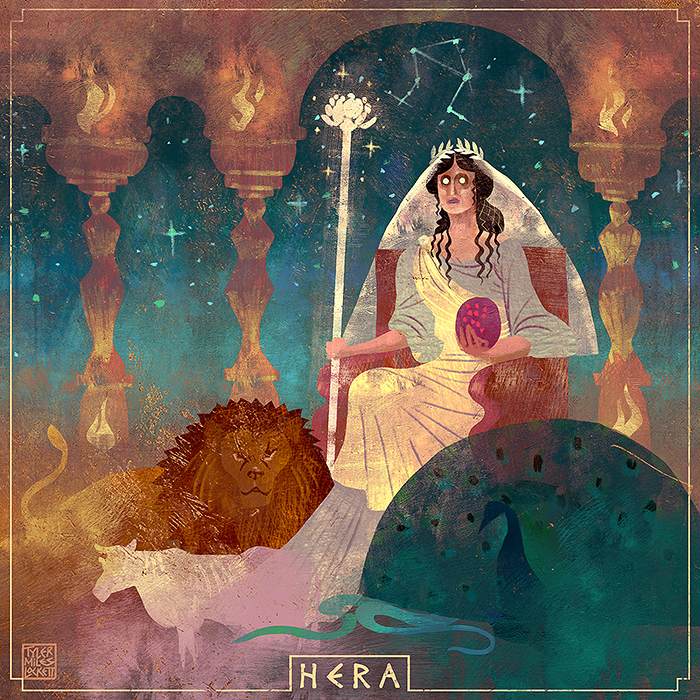
- Animals: Cow & peacock
- Significant places: Argos & Sparta
Hera is the sister wife of Zeus. She was a champion of the Greeks in Homer’s Iliad. And she had a particular affinity for the cities of Sparta and Argos.
Hera is the classic jealous, brooding wife. She has few redeeming qualities. In the Greek myths, she spends most of her time exacting revenge on the victims of her husband’s philandering.
Some of her notable cruelties involve turning a young maiden into a bear, removing the vocal cords of one of her servants, and casting a spell on Zeus to influence the outcome of the Trojan War.
We can’t be too hard on her though. Zeus wasn’t exactly the ideal husband.
Poseidon
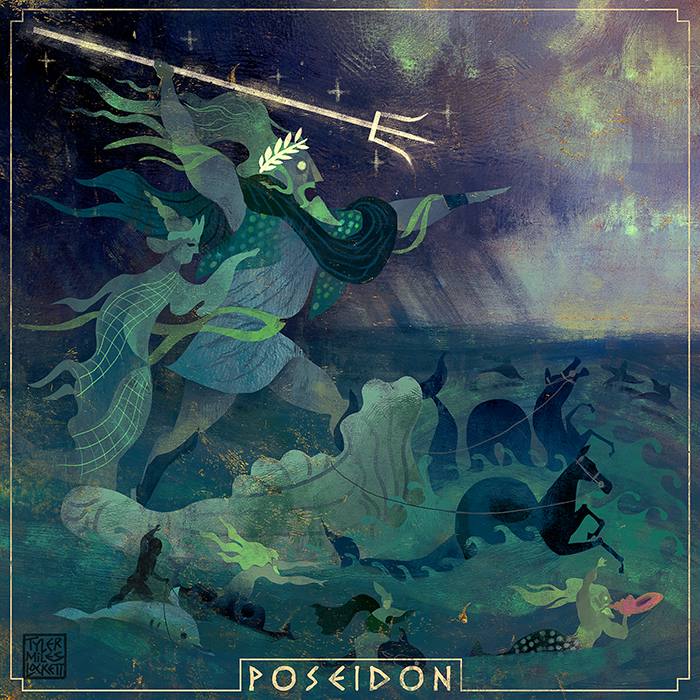
- Animal: Horse
Poseidon is the younger brother of Zeus and second in esteem in our list of Greek gods. He was god of the sea, often called “Earth-shaker” in the myths. And he is the party responsible for introducing humankind to the horse.
Poseidon wielded a trident and would travel across the seas on a golden horse-drawn chariot. Whenever he had a fit of rage, the seas would erupt in chaos.
Hades
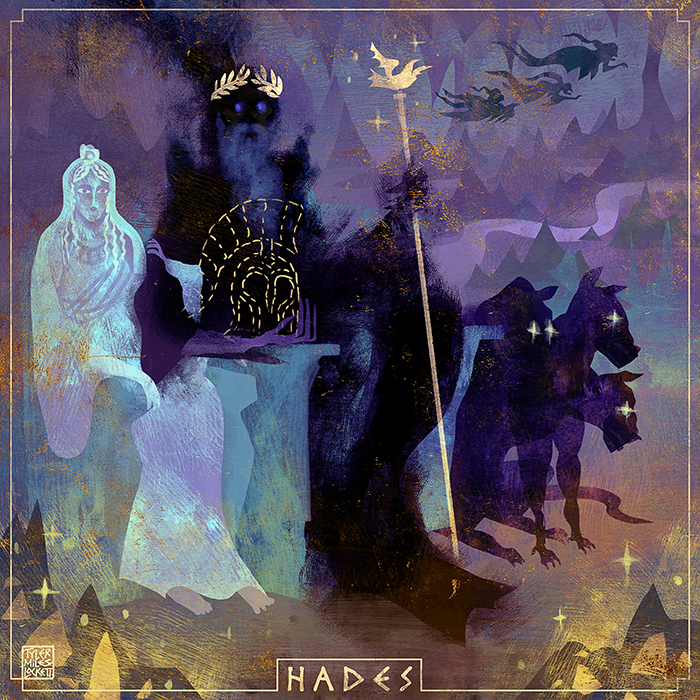
Hades was the youngest brother of Zeus. He had dominion over the underworld and the dead. He was also regarded as the god of wealth, considering that precious metals found below the ground fell under his purview.
His wife was Persephone, the daughter of Zeus and Demeter. Persephone lived with Hades in the underworld for half the year, corresponding to the seasons of fall and winter on Earth.
Hades was not an evil god, as he’s so often and mistakenly depicted. He was, rather, a very misunderstood and gloomy god.
His “hound,” Cerberus, was a three-headed dog that would guard the entrance to the underworld.
Athena
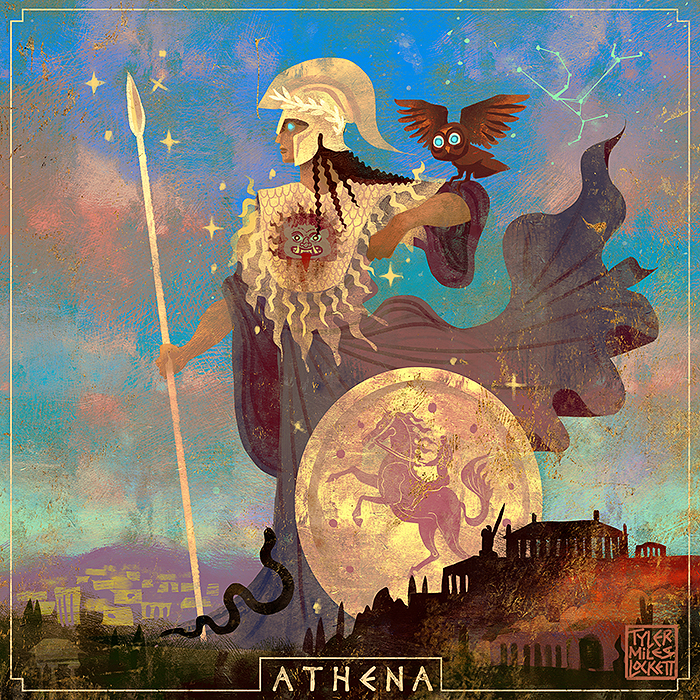
- Animal: Owl
- Tree: Olive
- Relevant place: Athens
Athena was the daughter of Zeus and his most beloved child. Her birth was precarious — even by the standards of Greek myth.
It goes something like this: One evening Zeus had a massive headache. And just as it became unbearable his head split open and Athena emerged from it. She was born in full armor and in grown adult woman form.
This favorite child of his went on to become the patron of Athens. The Parthenon, at the city’s center, was dedicated to her cult. At one point there was even a gargantuan statue of her inside of it.
Athena was a warrior goddess. And she was often associated with civilization, the arts, and the virtue of wisdom.
Apollo
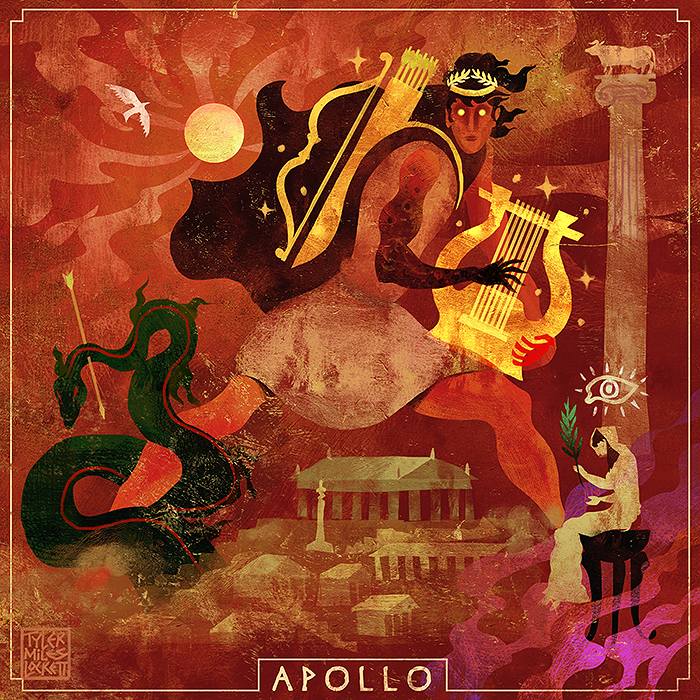
- Animals: Dolphin & crow
- Tree: Laurel
- Relevant places: The island of Delos & the Oracle at Delphi
Apollo, god of the sun and light, was a child of Zeus. He and his twin sister Artemis were born on the Greek island of Delos, which later became his cult center.
Apollo is associated with the virtue of truthfulness.
He’s an extraordinary and heroic god in the myths: He was the one who slayed the menacing python that ravaged Parnassus, a region in the interior of ancient Greece. And afterward, he established the famous oracle center at Delphi, known as the Pythian Oracle, on the place where the beast lay dead.
Apollo was also a Renaissance man. He played a golden lyre and was a lover of poetry. For this reason, he’s connected with music and the arts.
But, above all, Apollo served as a channel between the gods and mortal Greeks. He could purify the souls of those who came to seek his counsel.
Because of all these positive associations, Apollo is often called the “most Greek” in our list of Greek gods.
Artemis
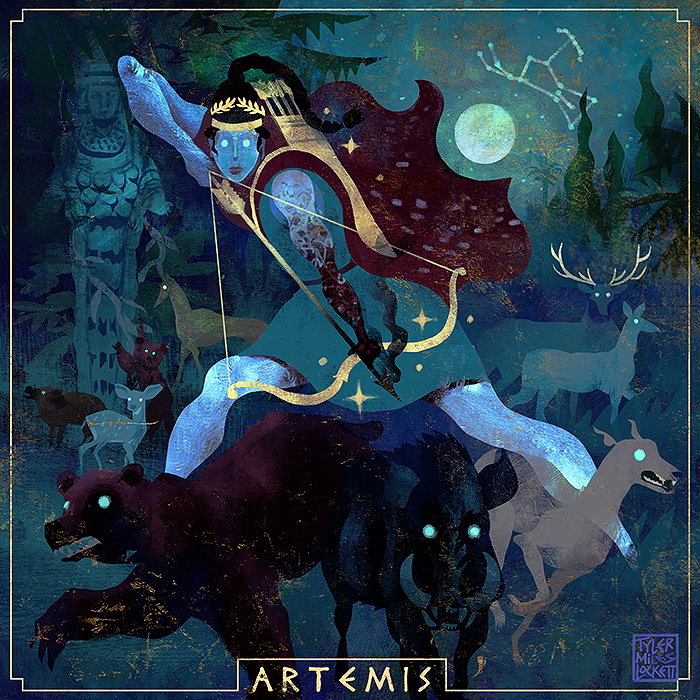
- Animal: Deer
- Tree: Cypress
- Relevant place: Delos
Apollo’s twin sister, Artemis, is goddess of the moon and the hunt.
In myths, she’s often seen running through forests under the blue light of the moon and stars. She was known to travel with bands of young huntresses and is associated with youth for this reason.
Artemis is connected with all wild animals due to her occupation, but most especially deer.
Aphrodite
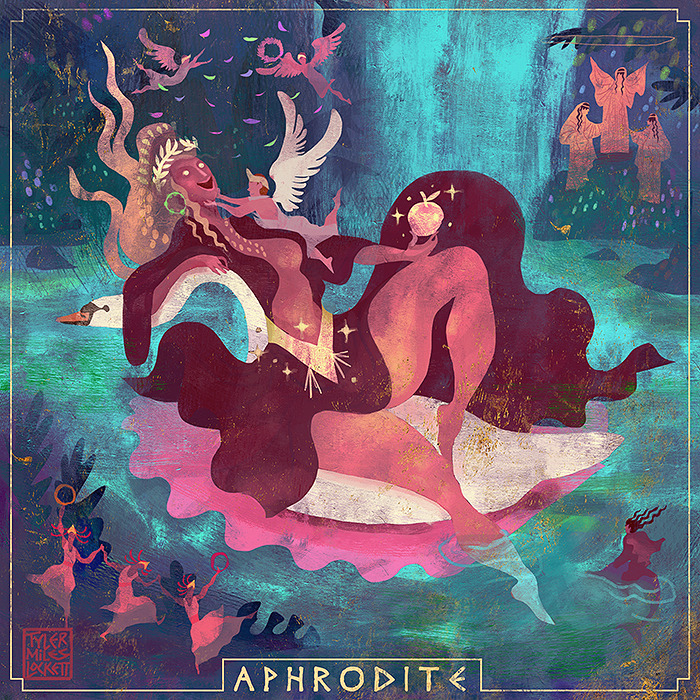
- Animals: Dove, sparrow & swan
- Tree: Myrtle
- Relevant place: Cyprus (birthplace & center of cult worship)
The goddess of love and beauty has no parents.
Well, at least not in the traditional sense. Some versions of mythology say she emerged from Uranus’s testicles after Cronus castrated him. Parentage aside, however, we know that Aphrodite was born at sea in the full bloom of womanhood.
We first meet her as she washes up on the blue shores of Cyprus in an elegant profusion of foam and flowers and shells.
Aphrodite’s beauty was irresistible to mortal men. And she rarely hesitated to use it to get what she wanted. For this reason, she’s the most alluring deity on our list of Greek gods.
Hermes
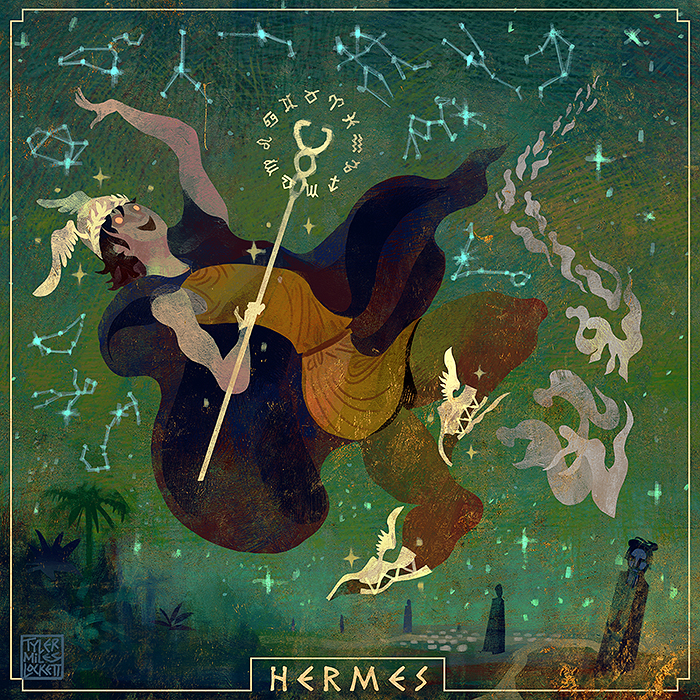
Another of Zeus’s children, Hermes was the messenger god of the Olympians. He had wings on his helmet and sandals, and, accordingly, he could fly about swiftly.
Hermes was known for his wit. He was also rather duplicitous.
Hermes was the god who guided souls to the River Styx, which would take them to their final dwelling place in Hades’ underworld.
Ares
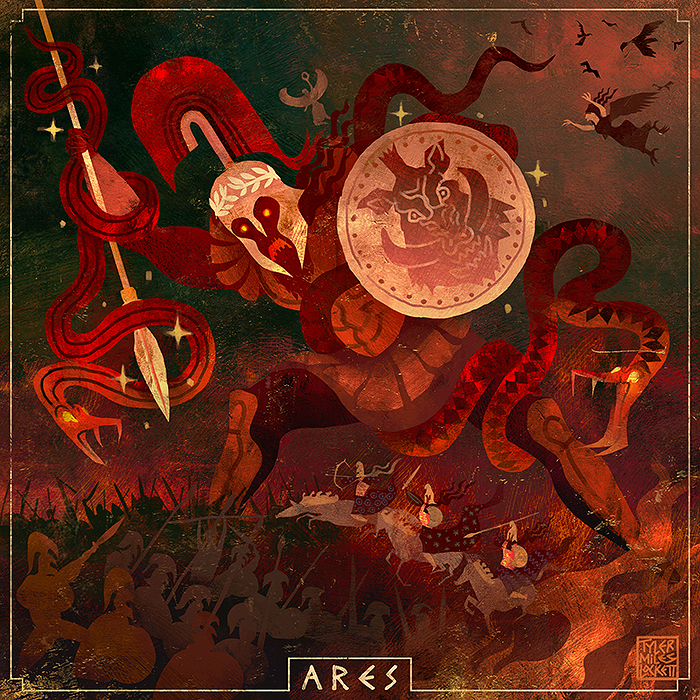
- Animal: Vulture & dog
- Relevant place: Thrace (legendary birthplace)
Ares was the god of war. He marshaled with the Trojans in Homer’s Iliad, and was practically glued to Prince Hector for most of it.
Every appearance of Ares in Greek mythology is accompanied by terror, discord, and blood. And, perhaps, it was for this reason that he wasn’t revered by the Greeks.
Unlike Athena, Apollo, and Aphrodite, Ares had no centers of cult worship in ancient Greece.
Hephaestus
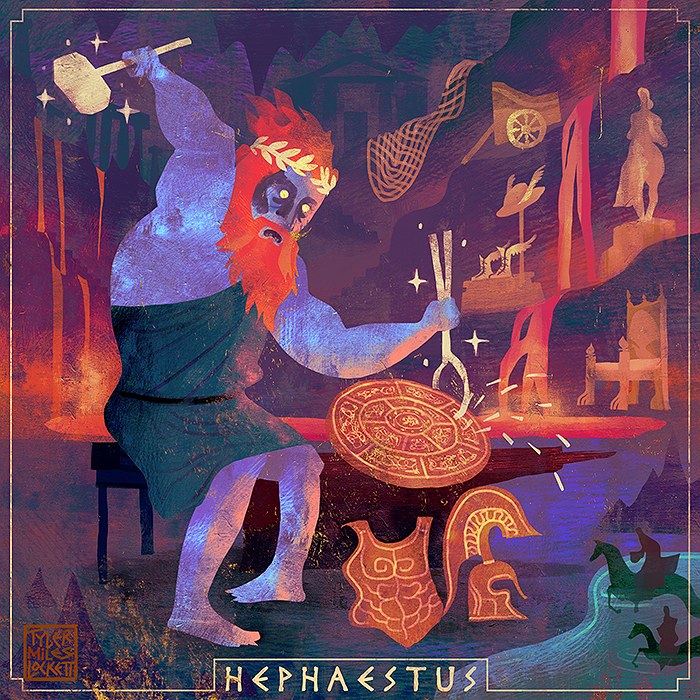
- Animal: Donkey
Hephaestus was the god of fire.
His parentage is uncertain. Some myths indicate that he was the child of Zeus and Hera. Others say that he was the product of Hera alone.
His role in Olympus was that of carpenter and smith. He built homes for the other gods and forged their weapons.
Hephaestus was an unfortunate god in one way: out of the entire list of Greek gods, he was the sole ugly one. However, that didn’t stop him from marrying the most beautiful of them. In many stories Aphrodite is referred to as his wife.
Hestia
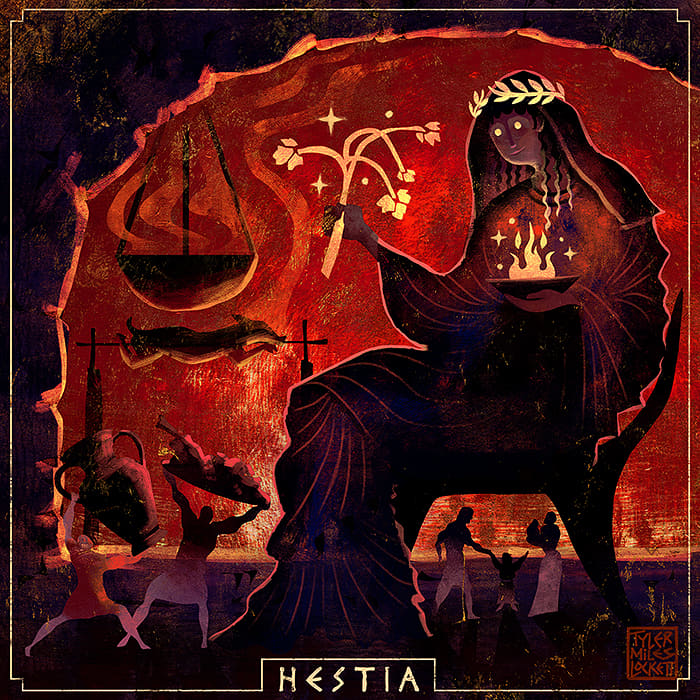
The final Olympian we’ll cover in this list of Greek gods is the virginal goddess Hestia. She was Zeus’s elder sister, and her job on Mount Olympus was to tend to the fire, also called the hearth.
Hestia is associated with domesticity and duty. She took an oath of celibacy early on and never married. She also abstained from all the squabbles and deception that plagued the lives of the other Olympians.
And for this reason, she’s not the most exciting goddess. But Hestia’s dutiful nature ensured the smooth functioning of Mount Olympus. In this way, she’s perhaps the most important of them all.
As above, so below: Wherever the hearth burned in Greece, Hestia was honored.
Great Gods of the Earth & Underworld
There are too many gods in Greek mythology to mention all in one book, let alone in this short list of Greek gods.
Here are some interesting gods and goddesses who were not one of the original 12 Olympians:
Demeter
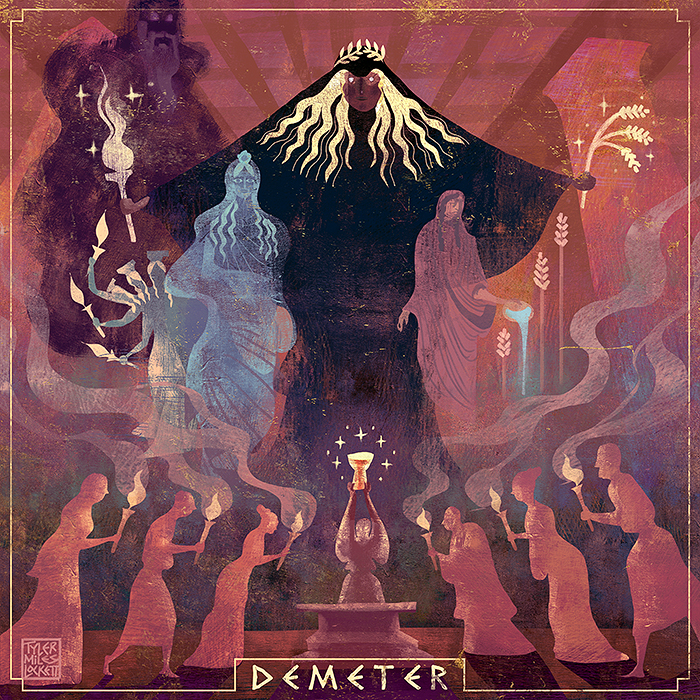
In some accounts Demeter is included as one of the 12 Olympian gods, and in others she’s not. In any case, she’s cut from the same cloth as the rest — Demeter is Zeus’s sister. And she’s a very important deity regardless of her classification.
Demeter is goddess of the harvest and agriculture. She, along with our next god Dionysus, reigned supreme on Earth.
Whereas the Olympian gods popped down to Earth as they pleased (often causing more havoc than help) Demeter played an active role in the lives of everyday Greeks. After all, they relied on the fruits of her harvest for survival.
And because of this she maintained a robust cult following.
The most famous of religious rites in the Greek world, the Eleusinian Mysteries, honored her and her daughter, Persephone. Everyone in the ancient world, from philosophers to kings to the common man, would have attended these mysteries at some point.
Dionysus
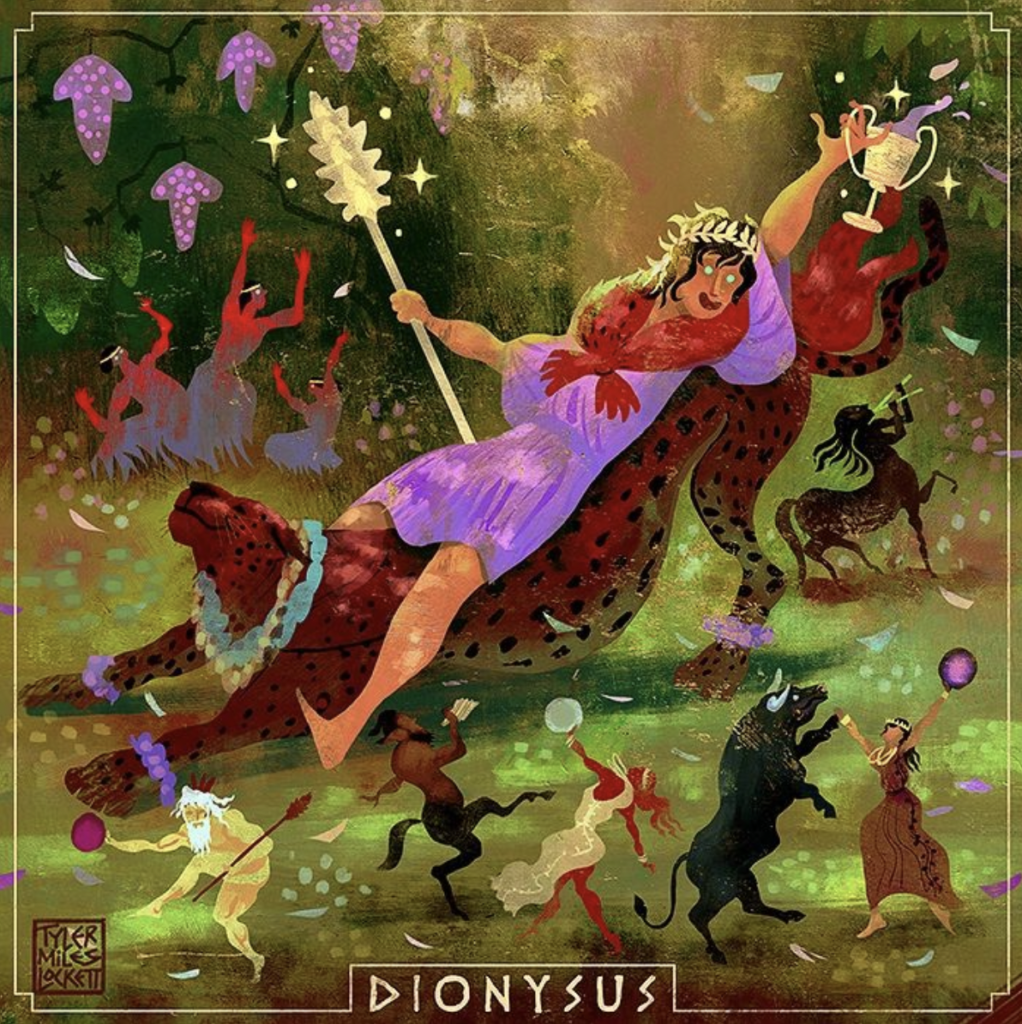
- Relevant place: Thebes (birthplace)
Dionysus, god of wine and merrymaking, was the product of Zeus’s love affair with a Theban princess called Semele. He’s the only deity in our list of Greek gods to have a mortal parent.
Princess Semele died young. And so nymphs raised Dionysus in the valleys of the Earth.
As a young adult he traveled far and wide — to Asia Minor, Persia, and even Arabia — bringing with him the culture of the vine.
Wherever Dionysus went fun and laughter followed. So too followed a cast of wild characters, like the Maenads. These were women who, after imbibing, would run about in a frenzy of drunk ecstasy.
They would often become violent too. As would Dionysus. He is famous for his fits of rage throughout the myths. And in some he’s even associated with insanity.
Persephone
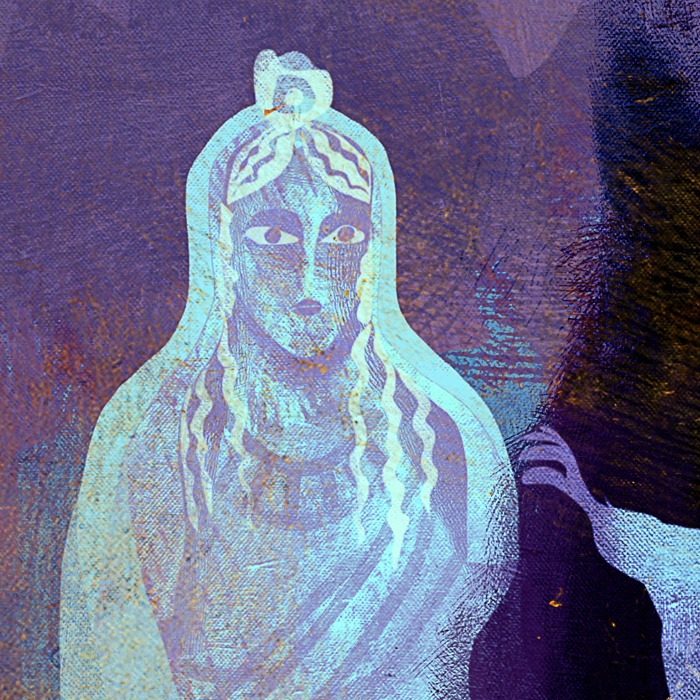
- Tree: Pomegranate
Our list of Greek gods concludes with Persephone, the daughter of Demeter and Zeus. She is goddess of the Spring and vegetation.
This maiden goddess also managed to earn herself the designation “Queen of the Underworld” after being abducted by Hades.
Her principle myth goes as follows: One day young Persephone was playing in a field. Hades, who was captivated by her beauty, seized the moment and abducted her. He arose from a chasm in the ground on a black steed and dragged her down to the underworld.
Persephone was forced to marry Hades. She had to swallow a pomegranate seed as a token of her fidelity to him.
When Demeter discovered that Persephone had been abducted, she fell into a depression. As a result, all the plants and crops died. The harvests ceased, and a cold winter fell upon Greece. The conditions got so bad that the Olympian gods had to intervene. It was finally agreed upon that Persephone could split her time between Hades and Demeter.
So for half the year Persephone lived in the underworld and the other half she lived with her mother on Earth. That’s why we have winter and summer.
Award-winning artist, Tyler Miles Lockett, supplied all of the enchanting illustrations in this post, including its featured image. Thank you, Tyler!
